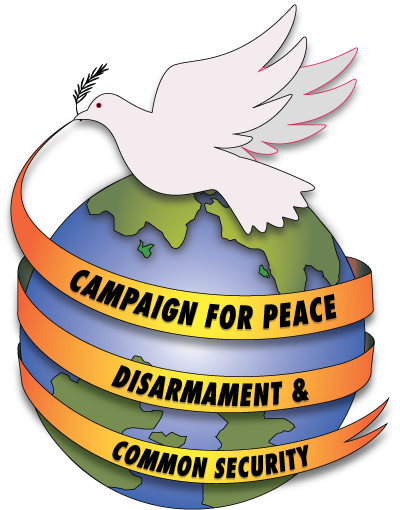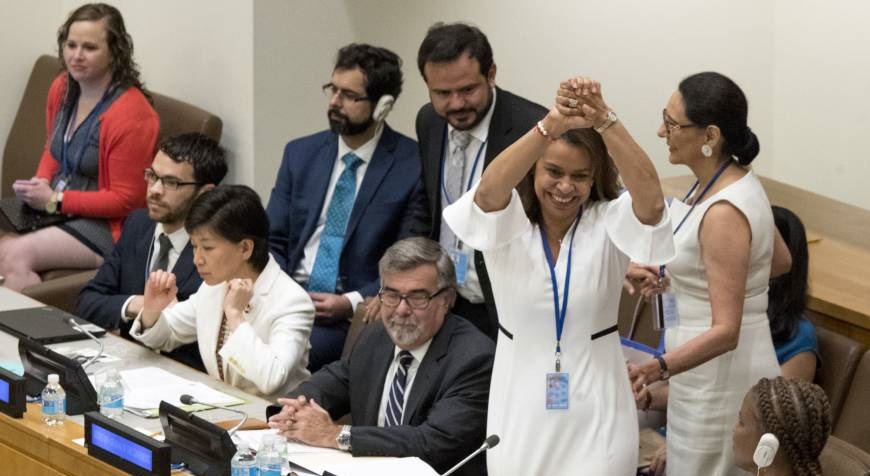by Jerry Ross
In a historic step forward for nuclear disarmament, Honduras became the 50th nation to ratify the UN Treaty on the Prohibition of Nuclear Weapons (TPNW) on October 24, guaranteeing that the treaty will enter into force on Jan. 22. While the US press has paid little attention to this momentous agreement, it made headlines in much of the rest of the world. Under its provisions, the possession, threat to use, or any actual use of nuclear weapons is an international crime.
Of course, the nuclear nations and their allies have boycotted it. In fact, in a breathtaking affront to other nations’ sovereignty, the US made a last-ditch effort to sink the treaty by sending letters to its signatories urging them to withdraw! But its implementation is a watershed moment in the long fight to eliminate these horrific weapons. The treaty will not cause nuclear weapons to disappear any time soon, but will over time erode their legitimacy and compel nations to pursue a new framework for international security.
In 2017, the International Campaign to Abolish Nuclear Weapons (ICAN) won the Nobel Peace Prize for bringing together 122 nations in the UN to approve this treaty. Following approval, it required ratification by 50 of the signatories to come into force. The treaty is based on the recognition that the humanitarian consequences of nuclear weapons are so horrendous that no nation should possess them. This is not unprecedented. The global community (including the US) has in the past agreed to ban chemical and other weapons of mass destruction.
The treaty is a particular triumph for those who suffered most in the initial use and subsequent testing of atomic weapons – the Hibakusha (Japanese for “atom bomb survivor”). They have made it their life goal to eliminate these weapons.
It is also a remarkable and fitting tribute to the United Nations that this treaty was ratified by the 50th nation on the 75th anniversary to the day of the UN’s founding, and a resounding reaffirmation of the power and need for this global institution for world peace. The treaty would be unimaginable, of course, were it not for the United Nations itself. In the aftermath of World War II, it was obvious the world needed a global institution to prevent such all-out carnage from ever happening again, much less the Armageddon foretold by the dawning of the nuclear age. Indeed, the very first resolution of that new world body was to seek an end to nuclear weapons.
The United Nations that was created has been imperfect. It did not assure 75 years of peace. But it did form the basis of an emergent world order, provide a forum for debate instead of conflict, give rise to some degree of great power restraint, and spawn global efforts to address the needs of an increasingly interconnected planet. Over time, the evidence that certain problems that can only be solved through global collective action—climate change, migration, a financial system susceptible to global disruption, and now the Covid pandemic—has only grown. If there were no UN today, for all its limitations, we would be struggling to invent one.
The Treaty on the Prohibition of Nuclear Weapons is not a new idea in international agreements. In 1970, all of the then five nuclear powers agreed to work toward the elimination of their nuclear arms in exchange for other nations forgoing the development of such weapons. This Nuclear Nonproliferation Treaty (NPT) was and remains a legally binding treaty. Most of the rest of the world, with four exceptions, lived up to their obligations, so that today we have nine nuclear powers when there might have been dozens. That is a remarkably good thing. But the nuclear “haves” continue to renege on their part of the bargain, exercising nuclear blackmail when it is convenient to do so, risking the welfare of all peoples for their own selfish interests. Now the rest of the world has said “Enough!”
It will take many years and much work for the Treaty on the Prohibition of Nuclear Weapons to fulfill its promise. It will begin by discouraging banks and other companies from doing business with the makers of nuclear weapons. Soon investors will withdraw their funds from companies engaged in what is now by international law a criminal activity. Popular pressures will grow to limit the vast sums spent on nuclear weapons and to adopt such sensible measures as “no first use” policies. Over time, acceptance of the treaty will de-legitimize the self-serving myth of “nuclear deterrence” for some that endangers the future of all.
Eventually non-nuclear states under the protection of a “nuclear umbrella” will realize its hollow promise and withdraw from such arrangements – just as New Zealand did long ago. Even the great powers will come to realize that nuclear arsenals are unaffordable, only serve to level the playing field with adversaries, and threaten their own citizens with destruction. Ultimately, the world will contract a new framework for common security based on international agreements, the only thing that history has shown to ultimately endure.
The TPNW is a glowing achievement, but only the glimmer of light that foretells the dawn. To paraphrase Churchill’s words from another time: This is not the end; it is not even the beginning of the end. But it is, perhaps, the end of the beginning of the struggle to rid the world of nuclear weapons. And one we should wholeheartedly celebrate.
—Jerry Ross is Secretary of the Massachusetts Peace Action Nuclear Disarmament Working Group and serves on the board of the Campaign for Peace, Disarmament and Common Security. In 2018 he was a delegate to the World Conference Against A&H Bombs held in Hiroshima and Nagasaki, Japan.
Original Article: https://masspeaceaction.org/treaty-banning-nuclear-weapons-takes-effect/

